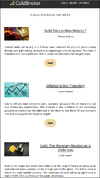- Joined
- 20 July 2021
- Posts
- 11,443
- Reactions
- 15,890
REMEMBER even Sovereign ( government ) bonds can default ( cost you money ) you can have a 'soft default ' , the nicer end is they miss an interest payment or two up to say giving you back 30 cents in the dollar ( or less ) like during the Greek crisis , or a 'hard default ' where you get almost nothing back even if you sue successfully ( and might have to wait years extra for anything you get back )
THERE IS ALWAYS some risk involved ( sometimes tiny , sometimes acceptable and sometimes HIGH risk )
THERE IS ALWAYS some risk involved ( sometimes tiny , sometimes acceptable and sometimes HIGH risk )

